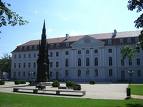Hugo Paul Friedrich Schulz 1853 - 1932
January 04, 2009
 Hugo Paul Friedrich
Schulz 1853
Hugo Paul Friedrich
Schulz 1853
- 1932 was a German Pharmacologist from Wesel, Rhenish Prussia, and Professor of Pharmacology at the University of Greifswald.
Hugo Schulz, and his colleague Rudolf Arndt, a psychiatrist and advocate of homeopathy, are known for research of a phenomenon known as hormesis, which shows that toxins can have the opposite effect in small doses than in large doses, the Arndt Schulz rule.
Schulz was supported in his research by August Karl Gustav Bier. Schulz was very influenced by August Karl Gustav Bier, and ’took a lively intetest in homeopathy‘.
Schulz was fascinated by homeopathy and conducted provings along homeopathic principles (proving and taking the homeopathic remedy sulphur, and a lecture delivered on a proving of ‘homeopathic iron’, and on the sublimate of mercury at 1:500,000 dilution (homeopathic 5th or 6th dulition) and of homeopathic silica), and he became a convinced homeopath, quoting homeopathic research in his publications.
Hugo Schulz included homeopathic thoughts into his lectures, and he was known as the ’Griefswald homeopath’
(http://en.wikipedia.org/wiki/Hugo_Paul_Friedrich_Schulz See also Schulz, Hugo and Crump, Ted (2007) ”NIH-98-134: Contemporary Medicine as Presented by its Practitioners Themselves, Leipzig,1923:217-250,” Dose-Response: An International Journal: Vol. 1: Iss. 3, Article 2. Available at: http://scholarworks.umass.edu/dose_response/vol1/iss3/2 ‘… Since the publishing of this work I have not only had the homeopathic lay organizations on my heels. Even some of my specialist colleagues have used this and my subsequent work to assist me in acquiring the honorary title of the “Greifswald homeopath”…’ ‘… Here I would like to add to this, and especially stress my viewpoint, that after interest in silicic acid had once been aroused by my work, soon thereafter several comments appeared in our scientific literature, which with respect to the therapeutic applicability of the acid made all manner of suggestions, especially in consideration of its use in pulmonary tuberculosis. On that I have the following to say: Actually and above all at the present time we do not have any experience in the therapeutic benefit of silicic acid. Certainly, however, sufficient material can be found on this question in the homeopathic literature. This school has already worked for a century with silicic acid if one would be also of advantage as well as desirable and beneficial for the patients to be treated with silicic acid if one would for the time being accept the findings made there. One would save much time and many disappointments…‘)
Hugo Schultz was very close to Eduard Friedrich Wilhelm Pfluger, and he was the father in law of Ernst Ferdinand Sauerbruch.
The Arndt Schulz rule was the culmination of research into homeopathy going back to Rudolf Ludwig Karl Virchow:
Virchow (Virch Arch 1854; 6: 133-34) was the first descriptor, three and a half decades in advance of Hugo Schulz.
Rudolf Ludwig Karl Virchow was extremely interested in homeopathy. He praised Samuel Hahnemann for being the first person to emirically and systematically test the effects of medicaments on healthy people, and for his concept of the minimum dose. Rudolf Ludwig Karl Virchow credited Samuel Hahnemann’s theory of homeopathy with stimulating new and detailed investigations in chemisty.
From http://carcin.oxfordjournals.org/content/26/11/1835.full?ref=%25C4%25B0lkSexShop.Com This provided a toxicological explanation for Schulz’s development of homeopathic ideas. As a result of the publicity following these initial studies he became the main academic hero for numerous advocates of homeopathy, and thus the theory of hormesis was born in close association with homeopathy…
From http://en.wikipedia.org/wiki/Hugo_Paul_Friedrich_Schulz Schulz studied medicine in the universities of Heidelberg and Bonn, where he did scientific work in the physiological institute of Eduard Friedrich Wilhelm Pfluger. He earned his doctorate in 1877. In 1883 he became a Professor of Pharmacology at the University of Greifswald.
Schulz is known for his research of a phenomenon known as hormesis, which shows that toxins can have the opposite effect in small doses than in large doses. He proved this in his experiments with chemical compounds on yeast cells. From his research came the Arndt Schulz rule, a law concerning dosages in toxicology; named along with Rudolf Arndt.
Schultz published several works in the field of pharmacology; his 1898 book Pharmakotherapi being the best known.